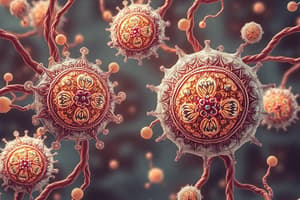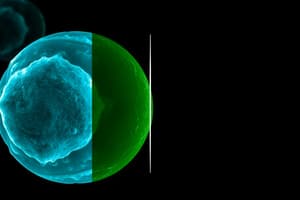Podcast
Questions and Answers
What is the role of cyclin proteins in the cell cycle?
What is the role of cyclin proteins in the cell cycle?
- They directly phosphorylate target proteins independent of CDKs.
- They are only synthesized during the M phase.
- They regulate cell cycle progression by activating CDKs. (correct)
- They inhibit cyclin-dependent kinases (CDKs) from functioning.
Which cyclin is specifically important for the transition from G1 to S phase?
Which cyclin is specifically important for the transition from G1 to S phase?
- Cyclin B
- Cyclin D (correct)
- Cyclin A
- Cyclin E
What is the consequence of a cell failing to complete the S phase successfully?
What is the consequence of a cell failing to complete the S phase successfully?
- Cell divides without DNA synthesis.
- Cell undergoes apoptosis. (correct)
- Cell replicates its DNA again.
- Cell enters G2 phase prematurely.
How are CDK and cyclin complexes regulated in terms of activity?
How are CDK and cyclin complexes regulated in terms of activity?
What occurs to the retinoblastoma protein (Rb) when it is phosphorylated?
What occurs to the retinoblastoma protein (Rb) when it is phosphorylated?
What phase is Cyclin B crucial for during the cell cycle?
What phase is Cyclin B crucial for during the cell cycle?
What effect does the dephosphorylated state of Rb have on E2F transcription factors?
What effect does the dephosphorylated state of Rb have on E2F transcription factors?
What ensures that cyclin levels peak and then decline at specific times during the cell cycle?
What ensures that cyclin levels peak and then decline at specific times during the cell cycle?
What is the primary function of apoptosis in the context of tissue regulation?
What is the primary function of apoptosis in the context of tissue regulation?
How does cancer typically affect the regulation of cell proliferation?
How does cancer typically affect the regulation of cell proliferation?
What occurs during the G1 phase of the cell cycle?
What occurs during the G1 phase of the cell cycle?
What must occur before a cell transitions from G1 to S phase?
What must occur before a cell transitions from G1 to S phase?
What is the significance of the G2 checkpoint in the cell cycle?
What is the significance of the G2 checkpoint in the cell cycle?
Which statement best characterizes the G0 phase of the cell cycle?
Which statement best characterizes the G0 phase of the cell cycle?
What process is often disrupted in cancer, leading to uncontrolled cell growth?
What process is often disrupted in cancer, leading to uncontrolled cell growth?
What role do signals that block growth and promote cell death play in normal tissue regulation?
What role do signals that block growth and promote cell death play in normal tissue regulation?
Study Notes
Cell Division and Regulation
- Cells in growing and self-renewing tissues must survive and proliferate for proper tissue function.
- Active signals promote survival and growth, while inhibitory signals, including cell death, are blocked.
- Apoptosis results in the controlled death of unnecessary or damaged cells, eliminating overproduced or damaged cells.
Cancer and Uncontrolled Proliferation
- Cancer arises from the loss of regulatory mechanisms for cell division.
- Activation of growth-promoting signals combined with blockage of death-signals leads to uncontrolled cell proliferation.
- Tumor suppressor gene loss or oncogene activation disrupts the cell cycle, resulting in tumor development.
Cell Cycle Regulation
- G1 Phase: The cell grows and repairs DNA without replicating its genetic material.
- Checkpoint ensures DNA integrity before proceeding to the S phase.
- G0 Phase: Cells exit the cycle and may become terminally differentiated, rarely returning to proliferation without specific signals.
- S Phase: DNA synthesis occurs, ensuring the complete replication of chromosomes.
- G2 Phase: Final checkpoint assesses DNA synthesis completion and damage repair; cells may undergo apoptosis if unprepared.
- M Phase (Mitosis): Chromosomes align and separate; cell division (cytokinesis) occurs.
Cyclins and CDKs in Cell Cycle Progression
- Cyclins are crucial regulatory proteins that activate cyclin-dependent kinases (CDKs).
- Specific cyclins are produced and degraded at particular phases, ensuring timely transitions:
- Cyclin D: Facilitates G1 to S phase transition.
- Cyclin E: Drives the cell past the G1/S checkpoint.
- Cyclin A: Involved in S phase and G2/M transition.
- Cyclin B: Essential for M phase activity.
- Rapid turnover of cyclins maintains precise control of the cell cycle phases.
Cyclin-Dependent Kinases (CDKs)
- CDKs are serine/threonine kinases that phosphorylate proteins to regulate the cell cycle.
- CDK activity is dependent on cyclin binding; without cyclins, CDKs remain inactive.
- Different cyclins determine the specific target proteins that CDKs phosphorylate at each cell cycle phase.
- Rb (Retinoblastoma Protein) is a key target of CDK phosphorylation, acting as a tumor suppressor.
Interaction Between Rb and E2F
- Rb regulates the cell cycle at the G1/S transition and interacts with E2F transcription factors.
- When Rb is dephosphorylated, it binds to E2F, inhibiting its transcriptional activity.
- This binding prevents the expression of genes necessary for DNA synthesis, controlling progression to S phase.
Studying That Suits You
Use AI to generate personalized quizzes and flashcards to suit your learning preferences.
Description
Test your knowledge on the processes of cell division, growth regulation, and apoptosis. This quiz will cover important signals that influence cell survival and proliferation, as well as the mechanisms that lead to controlled cell death. Understand how these processes are crucial for tissue renewal and homeostasis.




